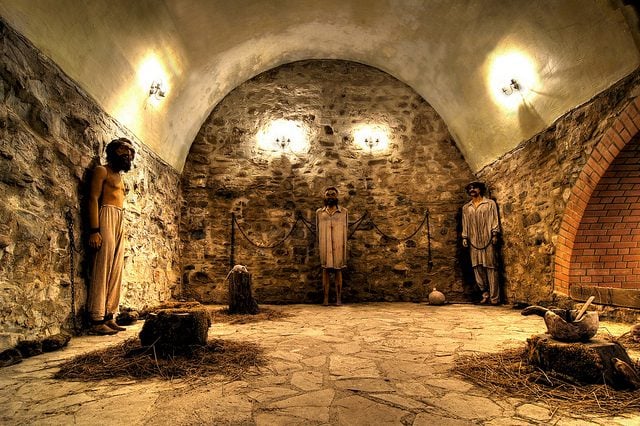
Proper 15C — Luke 12:49-56
As a parent of two little boys who in one breath dearly love each other and, in the next, dearly love to pester each other, I can’t say I was thrilled when I read the Gospel text for today, much less to have to preach on it.
This text mocked me all week long. Like when, one morning, all before breakfast, I found myself refereeing the third spat between my boys. Or when my spouse and I bickered about something one evening so important that now I can’t even remember what it was about.
I kept thinking, “Really, Jesus? You’ve come to bring division to families? That’s your good news for our fractured and divided world?” Honestly, if that’s the message of Christ, why bother? We’ve managed to come up with enough division on our own, thank you very much. In fact, we’re quite good at it.
For example, this week, many students will return to school, where they will be subjected to division upon division upon division. They will be judged on what clothes they wear to school, how their hair looks, what they say, how they walk, whether they are too smart, or not smart enough, attractive enough or not, athletic enough or not, and the list goes on.
Even as adults, we are constantly dividing ourselves into groups, the insiders and the outsiders, the good guys and the bad guys, Republicans and Democrats, Episcopalians and everybody else.
So, we’re supposed to wring good news somehow out of Jesus’ proclamation that he comes to bring division to families? Even Jesus didn’t seem to have a stellar relationship with his family. If you pay close attention to the synoptic gospels, Jesus’ relationship to his mother and brothers borders on the dysfunctional!
They think he’s gone crazy and they are worried for his safety, to say nothing of the shame he’s likely bringing on their family. At one point, his mother and brothers show up at one his jam-packed teachings, and when Jesus is told, our Savior disowns them in public.
He says, essentially, “That’s not my mom, and those aren’t my brothers. My family are those here gathered with me and those who are journeying with me on this path toward Jerusalem and the cross!”
He rejects his own family in front of a multitude and then goes on to accept into his new family prostitutes, tax collectors and outcasts, an open and inclusive stand that ironically causes division within polite society. He tells would-be followers not to bother burying their parents, an outrageous and insulting suggestion to the people of the time. He proclaims that anyone who leaves a family for him is blessed by God.
Jesus certainly seems to have an unconventional perspective on family values.
This is good news? In a way, yes. Because Jesus here isn’t teaching about family values as we understand them as modern Americans. Rather, Jesus is saying something radical about identity and who we understand ourselves to be. It can be confusing for a people who pride themselves on individualism and uniqueness, but for people in Jesus time, identity wasn’t something they spent a lot of time figuring out. Instead, identity was formed primarily by one’s family and kin. The son of carpenter grew up to become a carpenter. The son of a field laborer grew up and became a field laborer. And if you were daughter, well, you fared even worse. As a woman, you were a second-class citizen, part of the family’s property. You married who your family told you to marry. In other words, you primary identity revolved around whose child you were. It’s why, when people heard Jesus teaching and witnessed his miracles, they were shocked and said, “Wait, isn’t that Joseph’s boy from Nazareth?”
In their eyes, carpenter’s sons were not saviors. They were carpenters.
Family identity was so important that even sin could be inherited, which is why we sometimes hear the crowds in the gospels asking Jesus who in a family had sinned to cause a man to be blind, lame, deaf, or mute. The assumption was that God was so vindictive, God would punish a person for the sins of an ancestor just to prove a point.
But Jesus pushes back against all this. For Jesus, our identity begins not with our earthly family but our divine one. Whereas in our biological families, which are sometimes riddled with sibling rivalries, unworthiness, abuse, neglect or just not being loved fully for who we are, in the household of God, we are beloved, fundamentally and without exception.
That is our identity: We are fully loved by God, even as we are fully known by God.
It is what we proclaim at baptism, that God sees us as the children of God, and that we are marked as Christ’s own forever. And nothing, nothing, nothing can ever break that sacramental bond and action. We are Christ’s forever, loved eternally.
And that is our identity. It is why we say I am baptized, not I was baptized.
And it changes us, when we are touched by this kind of love, when we are baptized by its fire. When we open our eyes to our belovedness, we see that God no longer calls us strangers, no longer calls us slaves, no longer calls us sinners, but calls us sons and daughters.
The love of God is lavished on all, without regard to boundaries or the rules of polite, orderly society. It dares to believe that love transforms more profoundly than punishment. It dares to believe that love never ends, and that the greatest of these, is love.
Now, our temptation, though, is to think of love in terms of unity, in terms of holding hands around a campfire, and feeling warm fuzzy feelings.
But this love, God’s love, our gospel tells us today, is more likely to bring us stress and division rather than peace and harmony.
And this is Good News.
Because God’s love is inclusive enough and wide enough to upset those who want to limit love to a chosen few who follow a few cherry-picked and misconstrued rules and regulations about beliefs, about sexuality, about politics.
Because God’s love is radical enough and dangerous to threaten our own safety and security. It forces us to confront who we are, the evil we have done, left undone and done on our behalf. Not to make us feel guilty but to show us a way forward through our privilege and oppression of others and into right relationship with all of God’s beloved children, our neighbors. It asks us to see our worth not in our wealth or in what we acquire, but in what we give away and in how much we love.
Because God calls us to go out into the world and proclaim that this unconditional and unbounded love of God is for all.
You are God’s beloved, whoever you are, wherever you are, however you are.
And nothing can separate us from God’s love, not heights, nor depths, not angels or demons, not even hell itself.
This good news does indeed cause division. Proclaim to the world that God, in the cross, says that there is a nonnegotiable consequence for our sin. But, in God’s eternal love, that consequence isn’t death, isn’t eternal damnation or the unquenchable fires of hell. The consequence of our sins is forgiveness.*
It seems so irresponsible. So opulent. So potent. So dangerous.
But then again love always is.
And if we like Jesus proclaim this message, then we shouldn’t be surprise when our friends and even our families show up, divided and embarrassed by it all, wondering whether maybe we’ve gone a little crazy.
Will it cause division to stand with those our dominant society deems unworthy: the marginalized, the poor, the oppressed? Will it cause division to stand against injustice, racism, sexism and classism? Will it cause division to go out into the world and proclaim this unconditional and unbounded love of God for all?
Most certainly.
Martin Luther King, Jr., was divisive. Jonathan Daniels, an Episcopal seminarian whose Civil Rights martyrdom our church remembered this week, was divisive. Archbishop Desmond Tutu and Nelson Mandela in South Africa were divisive. Dorothy Day, divisive. Cesar Chavez, divisive. Will Campbell, divisive. Clarence Jordan of Koinonia Farm in Americus, Ga., divisive.
So, thanks be to God that the love of God causes division, because some things are worth fighting for. Thanks be to God that the love of God is so great it will make us uncomfortable. Thanks be to God that the love of God is big enough not just to handle division but to spark it. Thanks be to God that we are God’s beloved.
Still I have to be honest. It is hard to stand up here and say this today. It is the Good News, and I believe it is the Good News God has for us. Even though I intellectually know how much God loves us, I’ll be damned if I can feel it this week. With bills, funerals, and the day-to-day stress of back-to-school bustles, a perpetually unclean house, I haven’t had a lot of time to feel all that beloved.
And I know some of you have had worse weeks than I have, worse months than I have.
Maybe you’re not feeling that beloved either.
This week, the best I can muster for myself, for me personally, standing up here, is the stark recognition that my belovedness in God is not dependent on whether I feel it.
My belovedness in God simply is.
It’s nonnegotiable.
It is my identity.
I am beloved.
We all are.
And all means all.
_____
* I believe I first ran across this idea from something the Rev. Nadia Bolz-Weber wrote. Anyway, I’m a fan of hers, and you should totally read her new book — Pastrix.
Two other sources were incredibly helpful for this sermon: one Barbara Brown Taylor’s book Gospel Medicine and my friend Jason Dye’s blog post Is God Neutral? about God taking sides.















